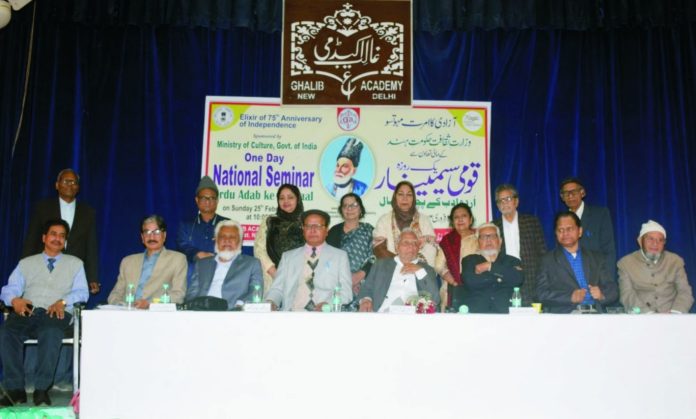– Abdul Bari Masoud
New Delhi, Mar. 6: Noted Urdu scholars took stock of the progress of Urdu literature in the last 75 years at a seminar here, saying that despite many roadblocks, Urdu literature flourished after the independence. An All-India Seminar titled “Seventy-Five Years of Urdu Literature” was organized, marking Mirza Ghalib’s 155th death anniversary and 55th founding anniversary of Ghalib Academy by Ghalib Academy under Amrit Mahotsav with monetary assistance from Union Ministry of Culture.
In his opening speech, Shamim Tariq, a scholar from Mumbai, said Urdu is part of India’s multifaceted culture. Urdu and Hindi are complementary languages. They support one another like sisters. There is continuity in Urdu literature, as the elegance and sophistication of Ghalib’s letters can be seen in Rashid Ahmed Siddiqui, Shibli Naumani, Sardar Ali Jafari, and Zoe Ansari’s writings. Later this tradition was divided into humorous and non-humorous prose. Some humorous prose deserves to be called funny prose.
Tariq continued, “After independence, Vedic literature was also written in Urdu.” Authors like Jaan Nisar Akhtar penned “Admi Ka Geet,” with the Upanishads at the forefront. Jayant Parmar penned a piece about Dalit writing. He emphasized that the lack of Urdu access in tribal areas was the reason for the paucity of Urdu writing on tribal subjects. He drew attention to the fact that Professor Gopichand Narang, who offered a linguistic analysis of Allama Iqbal and Mir Anis’s speeches, integrated linguistics into Urdu criticism.
Speaking about the combined heritage of Urdu and Hindi, Shamim Tariq said, during this period, in addition to novels, the Nukkad Natak tradition was also developed. Cultural studies were on the rise. He said that in the domain of translation, Urdu’s reach has grown over the past 75 years thanks to Zoe Ansari’s excellent translations from Russian into Urdu.
Dr. Nafis Bano read a paper titled “Urdu Ghazal in Seventy-Five Years”. Prof. Sharif Hussain Qasmi stated that Persian norms had a strong influence on Urdu. Head of Ghalib Academy governing board, Dr. GR Kanwal, stated that the Urdu education system has gotten worse over the past 75 years. Dr. Kanwal said that after Independence, implementation of three-language formula caused much damage to Urdu education.
He also highlighted that modernism was the dominant literary movement, and linguistics and Marxist literature studies took place during this period.
Prof. Qazi Jamal Hussain read the paper “Urdu Poem After Modernism”. According to him, Ghalib was the first poet of modern poetry and the final poet of classical poetry. Making a manifesto doesn’t alter people’s outlook on life. Modern sensibility and ways of experiencing have been altered by progress. Poems have evolved in the last 50 years in terms of mood and style. After every 60 and 70 years, opinions shift, he concluded.
In Urdu fiction, Dr. Nigar Azim stated that women’s paths to exploitation were paved with their own progress. Naima Jafari detailed the evolution of Urdu novel and asserted that novels created in last 75 years are both respectable and impressive. The other modern classics include short fiction by Saadat Hasan Manto (d. 1955) and novels like Aag ka Darya (1960) by Qurrat-ul-ain Hyder, Udas Naslain (1963) by Abdulla Husain, Ek Chadar Maili Si (1962) by Rajinder Singh Bedi, and Basti (1979) by Intizar Husain.
Speaking on Ghalib’s critiques, Dr. Khalid Alvi claimed that Mughal life was neither particularly courteous nor civilized. He referred to the book Ghalib Shikan by Yas Yagana Changezi. Other books on Ghalib discussed were those by Gopi Chand Narang, Khurshid-ul-Islam, and Nayyar Masood.
Professor Abdul Haq mentioned that Ghalib penned numerous naats in Persian and that his Persian language had a rich hue.
Dr. Khalid Mahmood remarked that it was commendable how quickly and concisely the scholars covered the topic.
In his presidential speech, Prof. Qazi Afzaal Hussain praised the academics for their papers on the topic as well. Thanking the audience, Dr. Kanwal said that while the thesis should be written at length, a summary should also be produced.
The Mudra Dance and Theater troupe performed a play called Hayat-e-Ghalib in the Ghalib Academy auditorium. Anees Azmi illuminated the history of Urdu theater for 75 years. Aamir Ahmed played the role of Ghalib, Samit Kumar played Zauq, Alakh played Momin, Shivam Kumar played Reporter, Nasser Khan played King, and Afaq played the character of Chacha in the drama, who did a good job portraying the poet. The audience liked the play very much.
The academy also organized a ghazal recitation event. Renowned vocalist Anupama Srivastava mesmerized the audience with her rendition of Ghalib’s ghazals in her beautiful voice.
Ghalib Academy also hosted a Mushaira during the four days of festivities. On the eve of Mir’s three hundredth birthday, most of the poets in the Mushaira sang ghazals based on Ghalib’s verse, “It is said that a Mir Bhi Tha.” Waqar Manvi and Dr. Kanwal served as the mushaira’s chairs.
The organizer of the Mushaira, Moin Shadab, stated that both fresh and established poets were represented in this year’s Mushaira. The show featured poetry readings by 31 poets. Regardless of the experience, it was breathtaking.




